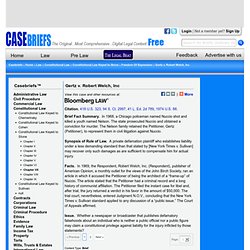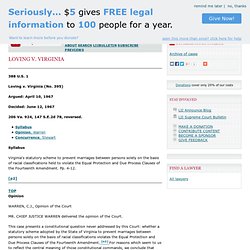

Defamation Law Made Simple. "Defamation" is a catch-all term for any statement that hurts someone's reputation.

Written defamation is called "libel," and spoken defamation is called "slander. " Defamation is not a crime, but it is a "tort" (a civil wrong, rather than a criminal wrong). A person who has been defamed can sue the person who did the defaming. (For in-depth information on defamation claims, check out Nolo's Defamation, Libel & Slander section.) Defamation law tries to balance competing interests: On the one hand, people should not ruin others' lives by telling lies about them; but on the other hand, people should be able to speak freely without fear of litigation over every insult, disagreement, or mistake. What the victim must prove to establish that defamation occurred The law of defamation varies from state to state, but there are some generally accepted rules.
Publishedfalseinjuriousunprivileged Let's look at each of these elements in detail. Personal Rights Law. Griswold v. Connecticut and the Evolution of Personal Privacy Rights. What's Next? Over the past three years, more than 60 lawsuits have been filed in federal court challenging the Affordable Care Act contraceptive coverage benefit.

These legal challenges are based on a central theme of today’s conservative movement, which argues contraception is immoral, and that the Supreme Court decision preventing states from criminalizing birth control was wrongly decided. That’s where things stand on the 48th anniversary of Griswold v. Connecticut. Why now? Why is the right gunning so hard to take down Griswold and gut individuals’ rights to privacy that include keeping the government out of their most intimate decisions?
The Supreme Court first laid the foundation for an individual right to privacy early in the 20th century in Lochner v. From Lochner, privacy rights more clearly became associated with the home and traditional, patriarchal constructions of family. Ken Cuccinelli’s sodomy obsession: The frightening legal implications of the Virginia politician’s crusade against oral and anal sex. Photo by Bill O'Leary/The Washington Post via Getty Images Ken Cuccinelli, Virginia’s attorney general, has garnered more than his share of national attention over the years, with high-profile legal crusades against global warming researchers, Obamacare, and abortion clinics.

But it’s his recent war on consensual sodomy in the commonwealth that has raised the most eyebrows as the gubernatorial candidate has made the issue a centerpiece of the final months of his campaign. Dahlia Lithwick writes about the courts and the law for Slate. Follow her on Twitter. Follow His critics, including the ladies of The View and Jay Leno, have responded to Cuccinelli’s quest to reinstate Virginia’s anti-sodomy or, “Crimes Against Nature” law, with snickers and winks.
It has long been the mantra of Republican politicians that judges—especially elitist federal judges—should never, ever legislate from the bench. Griswold v. Connecticut (1965) Gertz v. Robert Welch, Inc. View this case and other resources at: Citation. 418 U.S. 323, 94 S.

Ct. 2997, 41 L. Ed. 2d 789, 1974 U.S. 88. Brief Fact Summary. In 1968, a Chicago policeman named Nuccio shot and killed a youth named Nelson. Loving v. Virginia. Opinion WARREN, C.J., Opinion of the Court MR.

CHIEF JUSTICE WARREN delivered the opinion of the Court. This case presents a constitutional question never addressed by this Court: whether a statutory scheme adopted by the State of Virginia to prevent marriages between persons solely on the basis of racial classifications violates the Equal Protection and Due Process Clauses of the Fourteenth Amendment. [n1] For reasons which seem to us to reflect the central meaning of those constitutional commands, we conclude that these statutes cannot stand consistently with the Fourteenth Amendment.
In June, 1958, two residents of Virginia, Mildred Jeter, a Negro woman, and Richard Loving, a white man, were married in the District of Columbia pursuant to its laws. Almighty God created the races white, black, yellow, malay and red, and he placed them on separate continents.